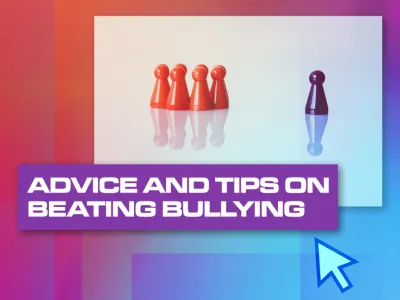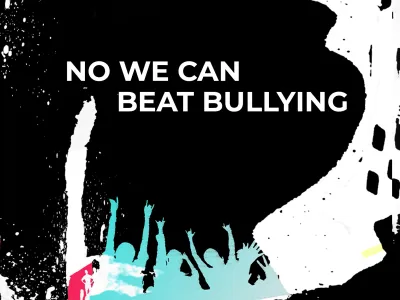
Your Questions, Answered: Bullying Behaviour
In our third Ask Us Anything of the series, we teamed up with our pals at The Diana Award - a London-based charity with the aim to continue Princess Diana's belief that young people have the power to change the world for the better - to answer your questions on Bullying Behaviour. We put together a list of the top questions you asked and sent them over for their responses. Here’s what they had to say…
My friends say it’s just bants but it hurts my feelings. Am I being too sensitive?
Banter. We’ve all heard of it, right? But can you define it?
Banter is ‘the playful and friendly exchange of teasing remarks’. This means everyone involved in the conversation should be ‘in on the joke’ and find it equally as funny. Banter shouldn’t be hurtful or mention things that someone might not feel confident about, for example, appearance. Banter shouldn’t be threatening or abusive and shouldn’t target a person’s protected characteristics such as disability, race, religion or sexual orientation. If the other person is not finding the ‘joke’ funny, it could be bullying behaviour and it should be addressed.
If you are on the receiving end of this ‘banter’ and something is making you uncomfortable, you can explain how their words have made you feel. If you feel able to, challenge their comments in a calm manner and encourage them to consider the impact of their words on others. Once they are aware of how their words and actions can make others feel, they can make a choice about their behaviour in the future. If they persist, this is bullying behaviour and it’s important to speak up if you see or experience it, by talking to a friend, family member or trusted adult like a teacher. If you witness bullying behaviour which is played off as ‘banter’, speak to the person experiencing it to check if they are okay and report it.
No one believes I’m getting bullied. What should I do?
If you are experiencing bullying behaviour, it can make you feel low, helpless and isolated. But we’re here to remind you that you are not alone and there are people around you that care about you and want to help. For this reason - and for your own mental health - it’s important to talk to someone you trust.
Check out our article here on what to do if you are experiencing bullying behaviour. It’s got lots of advice about what to and who to speak to.
And remember, while it can be tempting, it’s important to never retaliate if you are experiencing bullying behaviour. This could make the situation worse. Instead, if the bullying behaviour is taking place in person, try to leave the situation. If it is happening online you should screenshot for evidence, block the user and report the post or user, but don’t answer back.
My friend is getting bullied. How can I help without putting myself in the firing line?
It can be upsetting to learn that your friend is experiencing bullying behaviour. At The Diana Award, we believe that it’s important to be an Upstander not a Bystander, when you see or hear bullying behaviour taking place. An Upstander is someone who stands up and takes action when they see something that isn’t right. Here at The Diana Award, we believe every young person should be an Upstander and support their peers when they witness or hear about bullying behaviour.
We wrote this article about what to do if your friends are being bullied, so why not take a read of that. It’s about how to spot different types of bullying behaviour and the actions you can take - with your friend - to put an end to it.
I heard that bullies only bully other people because they got bullied first. Is that true?
There are lots of reasons why someone may exhibit bullying behaviour and it’s great to hear that you’d like to understand and find out more about why this happens. We recommend reading our ‘Why Do People Bully’ article here, which goes through the most common reasons, as well as our top tips to tackle bullying behaviour in your school.
I was getting bullied so I told a teacher and now everyone thinks I’m a snitch and they don’t talk to me anymore. What should I do?
The most important thing to remember when telling someone about bullying behaviour is to be clear about what ‘snitching’ means. Many people think ‘snitching’ is about intentionally getting someone into trouble to humiliate them. But you can think about it in a different way: if you report something, this means that you help someone to get out of trouble. If you are reporting the bullying behaviour you have seen, this is not ‘snitching’ - it is being an Upstander.
Sometimes I say mean things to my sister because she’s just so annoying. Am I a bully?
Family relationships can be complicated and many of us rely on our family for support. But spending long durations of time together – especially during the COVID-19 lockdown - can lead to fights, disagreements and even bullying behaviour.
Here are our top tips to tackle sibling bullying behaviour:
Set Boundaries: Why not use a rota to ensure equal sharing of rooms or space? This can include time frames - from morning, afternoon and breaks - for more boundaries for interaction between you and your sibling.
Spend Quality Time Together: Try to get outside for one hour of exercise a day. You can also do outdoor crafts, jigsaw puzzles, painting, baking and anything else you enjoy. Encourage your sibling to take part in an activity you both enjoy.
Bullying Behaviour vs Banter: ‘Banter’ is ‘the playful and friendly exchange of teasing remarks’ in which your sibling is in on the joke. Whereas ‘bullying behaviour’ is ‘repeated, negative behaviour intended to make someone feel upset, uncomfortable or unsafe’. Be mindful of what you say and whether your sibling is in on the joke (banter) or whether your behaviour may cross into bullying behaviour.
Use Empathy: It is important to listen to and try to understand your sibling’s perspective. Consider: 'How would you feel if they were doing that to you?’, ‘Do you think you would like to be treated in a similar way?', 'How do you think they feel when you are mean to them?’
Communicate & Make Up: If you argue with your sibling, try to ensure you make up afterwards by apologising. This will help to clear the air and help you both to move forward more positively. We recommend doing this once everyone has calmed down and when tempers are less likely to fray.
If you still need support when it comes to bullying, we have a free Crisis Messenger service, providing free, 24/7 crisis support across the UK. If you are a young person in crisis, you can text DA to 85258. Trained volunteers will listen to how you’re feeling and help you think the next step towards feeling better. You can also head to antibullyingpro.com to visit our Resource and Support Centre.
Want to learn more about bullying and what you can do to support Anti-Bullying Week? Why not try our brand new #NoWeCanBeatBullying Insta filter, take a look at our Advice and Tips on Beating Bullying, or read about The Five Celebs Who Shut Down Bullies.




